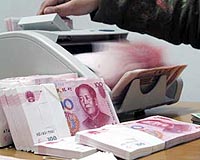 |
Hong Kong (AFP) Sept 13, 2010 Asian banks' shares rallied on Monday as regulators and investors shrugged off the biggest revamp to global banking rules in decades, confident that regional lenders were already in good shape. The stricter new rules -- known as Basel III -- were agreed on Sunday at a meeting in Switzerland of international central bankers and regulators, who said they would avert any repeat of the devastating world financial crisis. "This, along with global liquidity standards, will be an important financial reform measure after the financial crisis," the People's Bank of China, the country's central bank, said in a brief statement. The Basel III rules will require banks to raise substantially the amount of capital they hold in reserve -- a major change after the 2008 shock revealed inadequate financial buffers when crisis struck. But the tighter rules will be phased in over several years, and are seen in Asia as a bigger burden for hard-pressed lenders in the West. "I think this will have more impact on European banks, because local banks have a healthy capital adequacy ratio," Castor Pang, research director at the financial firm Cinda in Hong Kong, told Dow Jones Newswires. Against a backdrop of stricter regulation and a more risk-averse culture, Asian banks in general did not indulge in the orgy of risky bets on a shaky housing market that ignited a banking crisis in the United States and Britain. Outside of sclerotic Japan, banks in the region have not had to go cap in hand for government help, although margins are being squeezed in China as authorities seek higher reserves amid fears about a potential property bubble. Hong Kong-listed shares of global banking heavyweight HSBC closed up 1.83 percent. In Japan, MUFG shares rose 1.99 percent and Mizuho advanced 1.53 percent. "We consider that the capital reforms are well balanced," said an official at Japan's Financial Services Agency. "In that sense, banks in Japan will be able to achieve the standards through their management efforts." Under the new rules to be phased in from 2013, banks would be required to hold more reserves by January 1, 2015, with their "core Tier 1 capital" raised to 4.5 percent from 2.0 percent now. And banks would be required by January 1, 2019 to set aside an additional buffer of 2.5 percent to "withstand future periods of stress," bringing the total core reserves required to 7.0 percent. Australian Treasurer Wayne Swan said his country's banks would "comfortably meet the new requirements" -- but warned lenders against passing on any costs to customers. "These reforms will certainly not justify any bank looking to gouge its customers by raising rates above any future movements by the independent Reserve Bank (of Australia)," he said. "We've just seen the major banks all report healthy profits with net interest margins higher than pre-crisis, and their impairment (risky loan) levels continue to improve due to our strong economy." Stock in Australia's biggest bank, Commonwealth, ended 1.59 percent higher while in Singapore, DBS closed up 0.42 percent, OCBC rose 0.92 percent and UOB was off 0.21 percent. "The Basel Committee has provided more clarity and the timeline for implementation is also more generous than the original December 2009 proposal," a spokesman for UOB said. South Korea and Hong Kong also played down the impact of the new rules. Arthur Yuen, deputy chief executive of the Hong Kong Monetary Authority, the city's de facto central bank, told reporters: "In general, it's really not a problem for the banks in Hong Kong." He added that local banks' Tier 1 capital ratio was well above the beefed up Basel requirements. The regulations will be submitted for ratification at a G20 summit in South Korea in November. It was a compromise deal after the United States and Britain had pressed for a faster implementation. "This is something investors won't have to worry about for several years," Daiwa Securities Capital Markets analyst Masumi Yamamoto said in Tokyo.
Share This Article With Planet Earth
Related Links The Economy
 China posts fastest inflation rise in nearly two years
China posts fastest inflation rise in nearly two yearsBeijing (AFP) Sept 11, 2010 China said Saturday that consumer inflation rose at the fastest pace in nearly two years in August, as severe floods and unusually hot weather destroyed crops, driving up food prices. The figure marked the 10th straight month that the consumer price index, a key measure of inflation, has risen, but analysts said they did not think it would be enough to prompt policymakers to raise interest r ... read more |
|
| The content herein, unless otherwise known to be public domain, are Copyright 1995-2010 - SpaceDaily. AFP and UPI Wire Stories are copyright Agence France-Presse and United Press International. ESA Portal Reports are copyright European Space Agency. All NASA sourced material is public domain. Additional copyrights may apply in whole or part to other bona fide parties. Advertising does not imply endorsement,agreement or approval of any opinions, statements or information provided by SpaceDaily on any Web page published or hosted by SpaceDaily. Privacy Statement |